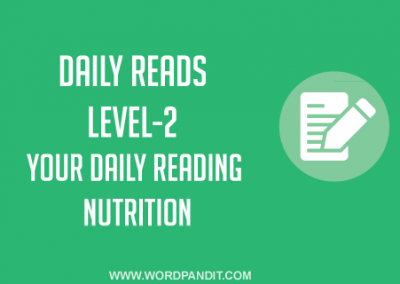Reading Suggestion-1
Article Name: How Cool Was That?
Author Name: Joseph Epstein
Source: The Weekly Standard
Category: Culture/Book Review
Summary for this article:
This article is essentially a book review that has been written in an oblique manner. Considering the language used and topic is consideration (how cool is cool), this makes for a really interesting read. One of the things with this article is that it challenges you to read closely to understand the points the author is making. In fact, for some of the sentences, you will have to re-read them to understand them clearly. One particular line that stands out from this article is: A larger, more complex question that Dinerstein’s book raises is: How cool is cool itself? Is the phenomenon of cool at all significant in our day? Was it ever?
The above line encapsulates the theme of the article and should help you identify what you are about to read.
Words to learn from this article:
Suedes: Leather which has been rubbed on one side to soften it
Hep: Trendy/ cool
Apotheosis: The best part of something/ quintessence
Pantheon: Temple where all the gods of all religions of any country
Covert: Done secretly
Indictment: Complain/ charge
Tenor voice: Highest or loudest male voice
Shoddy: Bad or poorly done
Poseur: To pretend
Vaunt: To brag
Reading Suggestion-1: Click to read full article
Reading Suggestion-2
Article Name: Science diplomacy is more vital than ever
Author Name: Editorial Team
Source: Scientific American
Category: Science and Technology
Summary for this article:
In this article, the author says how the US isolation with the world under Trump’s administration could hinder the progress of science. He says, citing various examples from the past, how two countries under hostile terms with each other worked together keeping aside their tensions to help find solutions and thereby progress in the field of science.
He says that we all need each other to solve world problems as research depends on ideas shared across political borders. In his concluding lines, the writer says that let’s not isolate ourselves but co-operate and co-ordinate using science as the diplomatic wedge to make the world a better and a safer place.
Words to learn from this article:
Headlong: Quick decision/ speedy reply
Strangle: To inhibit or destroy
Outreach: The act of reaching out
Envoy: Ambassador
Forge: Place where objects are made by heating and beating / to counterfeit
Ferry: To transport something or persons usually for small distances.
Reading Suggestion-2: Click to read full article
Reading Suggestion-3
Article Name: The Mozart in the Machine
Author Name: Yuval Noah Harari
Source: Bloomberg
Category: Culture
Summary for this article:
In this article, the author says that it is possible that sometime in the coming decades
a machine-learning algorithm could analyse the biometric data streaming from sensors on and inside your body, determine your personality type and your changing moods, and calculate the emotional impact that a particular song — or even a particular musical key — is likely to have on you. As music is the most susceptible form of art to big-data analysis as per one’s emotions the system could tune in songs to soothe the end user. You could also adjust the algorithm for getting latest random beats and recommendations. The algorithm would also monitor your reactions to understand which part of the music or line skips a beat in you and hence isn’t pleasing to you. By getting to study this it would filter its recommendations accordingly.
The author concludes by saying that will this result in great art? That would depend on the definition of art itself. If art is within human emotions then definitely this could be one of the best art in the world history and if art is something deeper than human emotions then such a thing could result in failure. But let’s not jump to perfection and try hitting what appeals the customer first.
Words to learn from this article:
Release some steam: To do something which will act as a stress buster
Gloom: Despondent or sad
Serendipity: Luck for finding or meeting someone accidentally
Wallow: To surge in mud or water
Quirk: Eccentric behaviour/ idiosyncrasy
Tinkering: To make small adjustments in order to repair something
Sinister: Having an evil appearance or feel
Narcissistic: Being self-absorbed or being egoistic
Garnered: To achieve or accumulate (garnered more evidence)
Reading Suggestion-3: Click to read full article














i mean its long time and you are not updating daily reading suggestion after daily reading suggestion-38
Look at the bright side: we are posting new quality content. Takes time to come up with good stuff..:)
level-2 article-3 the mozart in the machine link provided for this article is wrong
Hey Yogesh
Thanks. We have updated the link.
Regards
why this edition is updated so late
I am afraid but I did not get your question.
Wordpandit
What does “written in an oblique manner” mean?
Hi Snigdha
It refers to an indirect way of writing, wherein the author does not directly state things and uses indirect references to explain his viewpoint.
Regards
Wordpandit